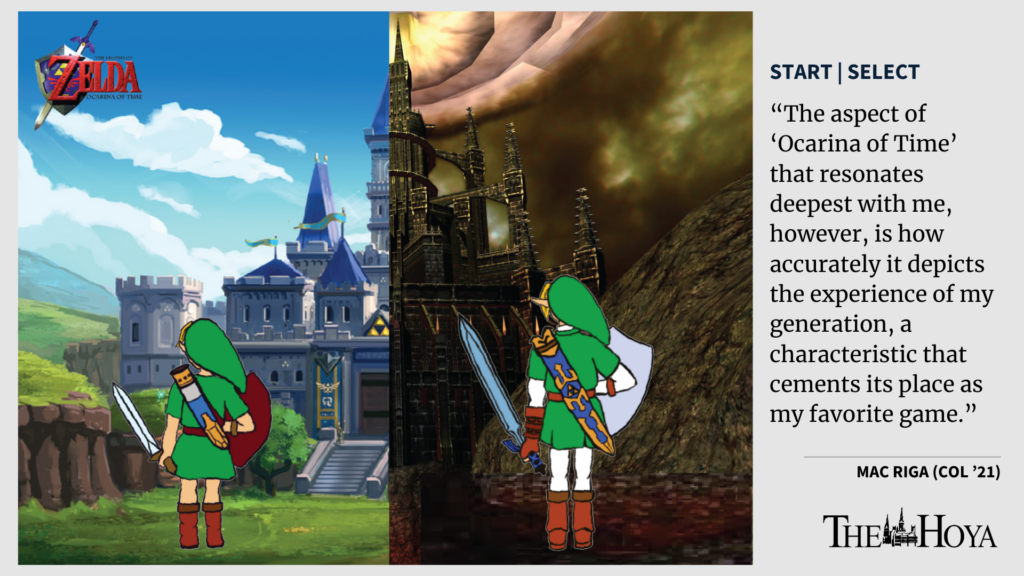It is hard to find something new to say about “The Legend of Zelda: Ocarina of Time.” Heralded by many as the greatest game of all time, more ink has been spilt over this game than perhaps any other.
I have always found that “Ocarina of Time” has something particular to say to folks like me, born at the turn of the century, just as the game was released in 1998. The game is a reflection of the demons of our age, the struggles we inherited and the complex tapestry of our internal lives. I could endlessly explain the technical achievements of the game or its lasting impact on the medium of gaming; all of those things are notable and contribute to the title’s legendary status.
The aspect of “Ocarina of Time” that resonates deepest with me, however, is how accurately it depicts the experience of my generation, a characteristic that cements its place as my favorite game.
“Ocarina of Time” is a game about growing up. The game’s central mechanic is protagonist Link’s ability to travel back and forth in time between the world of his childhood and his adulthood. This core concept, in addition to enabling some fantastic puzzles, makes the game a trove of environmental storytelling.
As a child, Link’s adventures are idyllic and full of promise; the characters he meets are friendly and colorful. The tasks are playful, like one mission in which Link is sent to wake up a sleeping farmer with chickens in danger. Link and the player succeed effortlessly and are told again and again by numerous mentor characters that they are destined for greatness.
Then, Link grows up. Upon achieving the goal of collecting three magical Macguffins, Link is transported seven years into the future. This event marks a significant tonal shift. All the locations the player explored previously have been shockingly changed. Instead of a bustling town square and Temple of Time, the player finds a town in haunting ruins. Link’s childhood home is overrun with monsters. The aquatic Zora’s Domain is frozen over. The world the player once knew is suddenly terrifying and alien.
Link’s adventures also shift drastically. He embarks on missions with immense weight, like when he is tasked with saving captives from being eaten by a beast and undoing the effects of magical brainwashing. His victories are bittersweet, seeing childhood friends again only for them to leave him forever. Even his childhood seems darker in retrospect; in a number of instances, the story requires Link to return to his childhood to tackle mini-dungeons that are far more grim than the rest of his youthful adventures. Through this tactic, “Ocarina of Time” literally gamifies the all-too-familiar feeling of looking back at the sometimes distressing realities of our youth through the nuanced lens of adulthood.
Reflected in the game’s mechanics and tonal shifts are the struggles of our generation. Over and over again, parents, teachers and even public figures assured us we were destined for exceptional greatness. Instead, we grew up to enter a grim world rife with inequity and strife: systemic racism, cataclysmic climate change and plutocratic pseudo-imperialism. We found ourselves propelled not by the promises of a bright future or personal glory, but out of devotion to the people we hold dear and a desire to make the lies of our childhood a reality in the future. Likewise, Link is driven not by a feeling of inherent greatness but by a sense of duty to the friends he loves and the world he lost.
Link’s is a dismal journey, but not a futile one. Despite everything, Link does make a difference. His world is indelibly changed, that much is certain — too much time was wasted, too much cruelty inflicted for it to ever be the same. The absence of the people Link lost echoes louder than any change for the better could. And yet in the midst of that despair, there is still hope.
Link sees new life blossom in every corner. True, the new world of his adulthood is filled with horrors, but there are also signs of rebirth: a child named for him and his heroic deeds, a safe haven built for the vulnerable flourishing in the midst of armageddon, and natural beauty restored to fullness. The sacrifice demanded of Link — demanded of us — was not fair, but there is an assuredness in its worth. We were both promised greatness but inherited a world in ruins. In Link’s turn, he promises the later generations hardship but leaves the world better than he found it. We strive to do the same.
Perhaps I project too much onto this game. Maybe these things I see in it are nothing more than strained inventions to justify the struggles and doubts of my own life. But even so, “Ocarina of Time” gives me hope. It tells me, in the end, my struggles will be worth something. Link’s story tells me, even in the midst of those doubts, I cannot sit idly by; instead, I must fight for justice even if the fight seems hopeless. This game tells me loved ones leave in painful and sudden ways, but some of them stay and stay for good. And the beauty of this game is it sends the same message to anyone who plays it, both of my generation and beyond. I see the ways in which “Ocarina of Time” speaks to me personally, but so too do I recognize the ways it speaks to everyone else.
“Ocarina of Time” shows the real, lasting good video games can create. These games help us understand ourselves and become better at loving and being kind. Most importantly, these games give us hope.















Gayle • Jun 14, 2021 at 11:21 pm
I mean for some The Legend of Zelda: Ocarina of Time might be great, but mostly its related to the Nintendo Fans.